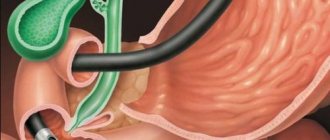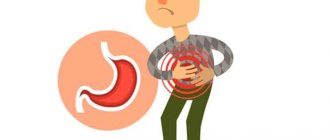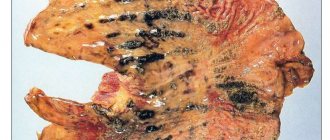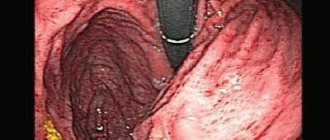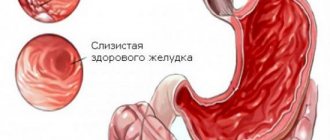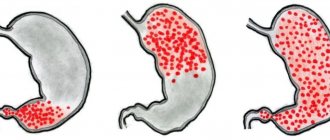Erosive gastritis is an inflammatory disease. It affects the gastric mucosa, causing the formation of erosions of various sizes on it. These formations do not penetrate deep into the walls of the stomach and do not leave marks after healing.
It is the depth of penetration into the stomach wall that distinguishes erosive gastritis from an ulcer. The latter disease can affect not only the inner surface, but also deeper tissues and even the muscle layer.
Erosive gastritis is dangerous due to complications. Statistics show that a fifth of gastric bleeding is associated with erosions on the mucous membrane. Therefore, in modern gastroenterology, this form of the disease is increasingly referred to as “hemorrhagic gastropathy or gastritis” and “papular gastropathy.”
Erosive gastritis is a common pathology. A quarter of examinations for heartburn, abdominal pain, and nausea end with this diagnosis. The disease affects both men and women. The disease can develop at any age. True, young children are diagnosed much less often.
Studies show that in recent years, cases of diagnosing erosive gastritis have become more frequent. According to some studies, the incidence of diseases has increased tenfold. Scientists attribute this to an increase in the amount of stress, disruption of diet and quality of nutrition. This may also be due to improved diagnostic methods. When carrying out preventive examinations, the disease can be identified at the initial stage, even in the absence of complaints.
Consult a gastroenterologist
Don't delay treatment
Causes of erosive gastritis
In the vast majority of cases, the development of the disease is caused by Helicobacter pylori. However, doctors tend to believe that the mere presence of bacteria in the stomach is not enough. For the disease to appear, a combination of several factors is necessary.
The bacterium Helicobacter pylori was isolated in 1981. It is resistant to acidic conditions and is capable of secreting enzymes that weaken the protective environment of the stomach walls. By multiplying, this microorganism causes local inflammation and the formation of erosions. Helicobacter pylori is quite resistant to antibacterial drugs, which makes treatment difficult.
Research shows that more than 70% of the world's population is infected with Helicobacter pylori. At the moment, this is the most common infection. However, for various reasons, in most cases the presence of bacteria in the body does not cause the development of the disease and infection proceeds unnoticed.
In addition to the presence of pathogenic microorganisms in the stomach, the development of erosive gastritis can also be provoked by other reasons:
- severe stress
- chronic mental stress
- regular alcohol intake
- eating disorder with long periods of fasting
- eating spicy and salty foods
- smoking in the morning before breakfast
- taking certain medications
- liver and pancreas diseases
- chronic gastrointestinal diseases
- diabetes
- harmful working conditions
- reflux of the contents of the duodenum into the stomach
The combination of infection by pathogenic microorganisms with provoking factors reduces the protective function of the body. There is a release of bile, increased production of pepsin and acid. This significantly impairs the ability of the epithelium to regenerate and produce protective mucus and leads to the appearance of defects in the gastric mucosa and the formation of erosive gastritis.
Etiological factors
The disease develops acutely and is characterized by damage to the gastric epithelium in response to the influence of aggressive factors. The main causes of this type of gastritis are:
- long-term use of NSAIDs;
- alcohol abuse;
- mental stress, neuroses;
- radiation exposure;
- mucosal ischemia;
- iatrogenic damage to the organ when inserting a nasogastric tube;
- eating too spicy or hot food.
With erosive gastritis, acidity increases, which contributes to the progression of the disease. Point erosions that occur in the first day after the initial exposure can transform into extensive foci of epithelial damage. Most often, the process develops in the mucous membrane of the stomach.
Clinicians also highlight the acute stress-induced inflammation seen in intensive care unit patients. Pathogenesis is associated with decreased blood flow in the vessels of the abdominal cavity and lack of enteral nutrition.
Classification of forms of erosive gastritis
- Primary erosions (have no connection with previously identified pathology) and secondary (the result of progression, existing disease).
- Malignant (appears in the presence of an oncological process) and benign (can be single or multiple).
- Immature (young formations) and mature (have areas of tissue necrosis).
Based on the type and shape of formations on the mucous membrane, the following types are distinguished:
- superficial (small, flat in shape and with a distinct edge);
- full (raised above the surface of the mucosa);
- polypoid (can have a diameter of up to one and a half centimeters, do not heal for a long time and constantly worsen).
Treatment approaches
Drug treatment includes long-term use of antisecretory drugs that provide a persistent increase in acidity in the stomach, which is necessary for rapid healing of erosions. For emergency treatment of bleeding, methods of surgical hemostasis (vessel clipping or electrocoagulation) are used.
Correction of water and electrolyte balance is carried out using infusion of crystalline and colloidal solutions.
Adequate treatment of the disease is impossible without prescribing a diet. The menu for erosive gastritis should consist of lean meats and fish, boiled or baked, cereals, stewed vegetables, and soups. Patients are advised to limit the consumption of fresh fruits and vegetables, meat broths, and yeast dough products as much as possible.
The prognosis is relatively favorable; with timely initiation of therapy, recovery occurs in most patients.
Symptoms of erosive gastritis
Patients suffering from erosive gastritis can present many different complaints, both specific and nonspecific:
- nausea and rare episodes of vomiting
- decreased appetite or complete absence of it
- increased gas formation
- heartburn
- belching
- pain in the epigastrium on an empty stomach or an hour and a half after eating
- sudden weight loss
- black stool due to bleeding
- vomiting black-brown mass
Patients may also complain of increased drowsiness and fatigue, decreased tolerance to usual stress, the appearance of shortness of breath and tachycardia. Such symptoms may indicate the presence of hidden bleeding.
The pathology symptoms listed above indicate that the disease may have symptoms of gastric bleeding and the presence of mucosal defects.
Symptoms indicating stomach problems
The reasons for contacting a gastroenterologist are:
- pain (on an empty stomach or after eating),
- nausea,
- vomit,
- problems with stool (constipation, diarrhea).
If such signs appear, you should immediately go to the doctor, who will conduct an appropriate examination and prescribe adequate treatment.
Sometimes gastritis occurs without pronounced symptoms, so you need to monitor your health and, at the slightest discomfort in the gastrointestinal tract, go to a gastroenterologist. The sooner treatment begins, the sooner and easier it is to get rid of this unpleasant disease.
How is erosive gastritis diagnosed?
Erosive gastritis has symptoms similar to other gastrointestinal diseases. Therefore, to clarify the diagnosis, additional examination is prescribed. Most often, doctors recommend the following laboratory and instrumental studies:
- a general blood test to determine the presence of anemia;
- determination of occult blood in feces;
- taking a section of the mucosa for cytology and histology;
- PCR for diagnosing Helicobacter pylori infection;
- fibrogastroscopy (FGDS) with a biopsy of the inflamed area;
- radiography with contrast.
Sign up for FGDS
Don't delay treatment
Which doctor should I contact?
In medical services, patients can take advantage of high-quality medical services.
- Here, accurate and correct diagnosis of gastritis, the degree of atrophy, as well as metaplasia and dysplasia, leading to stomach cancer, is guaranteed. All this is possible thanks to the use of high-tech endoscopic equipment.
- There is a histology laboratory at the clinic.
- An experienced team of specialist diagnosticians, histologists, endoscopists (clinicians, endoscopists, histologists) will objectively and quickly examine the condition of the mucous membrane, make an accurate diagnosis and develop a comprehensive treatment plan for erosive gastritis.
- At the request of the patient, gastroscopy is performed in a state of medicated sleep.
Treatment of erosive gastritis
For the treatment of pathology, conservative tactics are usually chosen. Surgery is very rarely required.
The basis of successful treatment is diet and regular medication. Doctors usually prescribe a set of tablets to destroy Helicobacter pylori, relieve symptoms of the disease and stimulate healing of the mucous membrane.
Since Helicobacter pylori is an antibiotic-resistant microorganism, a combination of three or four drugs is chosen to destroy it. Treatment is not easy and takes quite a long time.
If there is bleeding, in addition to taking medications, the doctor may recommend thermo- or electrocoagulation of the mucous membrane, laser exposure, staples or endoscopic stitching.
During treatment of the pathology, the patient should adhere to a fractional diet plan. There should be at least 5 small meals a day. To reduce the likelihood of mechanical damage to the mucous membrane during healing, you should eat grated food or cooked with steam. It is also necessary to avoid eating too hot or cold foods, and avoid eating salty, fried, fatty and spicy foods. Sodas, strong coffee, tea and alcoholic drinks are not allowed.
Complications
The most common complication is the transition of this form of gastritis to a chronic form, which is quite difficult to get rid of. A patient with this form will have to give up certain foods for the rest of his life, quit smoking and practically not drink alcohol. However, this is not the worst thing, because antral gastritis leads to gastric ulcers, the formation of growths and oncology.
However, complications can only arise if the stomach is not treated and the doctor’s recommendations are not followed at all. Therefore, at the first signs of illness, you should immediately consult a doctor.
To prevent the disease from relapsing, you need to try to exclude fast food, fatty foods, alcohol, bad habits, lack of sleep and frequent stress from your life. Only then will nothing threaten the health of the stomach.
Prevention
You can prevent the onset of the disease by observing personal hygiene measures, maintaining your diet, and giving up smoking and drinking alcoholic beverages. When working in hazardous industries, you should take precautions. When diagnosing diseases, carry out their timely treatment. You should also avoid stressful situations.
Why choose American Medical Clinic?
- Team of professionals. Candidates and doctors of medical sciences, professors and associate professors of departments of leading universities, doctors of the first and highest qualification categories work in the clinic 24 hours a day, 7 days a week. We work without holidays or weekends to ensure that you are healthy and happy.
- Regular professional development. Each doctor regularly takes advanced training courses, attends seminars, goes on internships, participates in conferences, and undergoes training abroad. This helps maintain the qualifications of doctors at the highest level. Today, the training of AMK doctors allows them to train young doctors, acting as experts at European-level seminars.
- Hi-tech. We regularly invest not only in training and professional development of personnel, but also in purchasing the most modern equipment from leading European manufacturers.
- The value of time. The American Medical Clinic has created all the conditions for a comfortable, comprehensive examination and diagnosis of a patient on the day of treatment.
- Trust from clients. Over 25 years of impeccable work, more than 500,000 patients have entrusted their health to us. More than 80% of patients recommend us to their family and friends.
- Guarantees. We are 100% responsible for the quality of the services provided, the high level of which is confirmed by many years of experience. The attention and sensitive attitude of doctors with more than ten years of experience in medical practice give a sustainable positive result.
Chronic gastritis with secretory insufficiency
This type of disease leads to atrophy of the gastric mucosa. In this situation, secretory activity is extremely unsatisfactory. This type of gastritis is typical for people of mature and old age.
Obvious signs may include loss of appetite, morning sickness, unpleasant taste in the mouth, frequent belching, rumbling in the stomach, a tendency to constipation, or dyspeptic stools.
Patients quickly lose weight, their endocrine system is disrupted, anemia develops, and hypovitaminosis is observed.
It should be remembered that treatment of atrophic gastritis should not be postponed until later. Otherwise, this may result in unpleasant consequences for the patient.
Treatment with aloe and honey
Honey is traditionally considered a product that helps with a variety of ailments and has a beneficial effect on the entire body. For erosive gastroenteritis, the combination of honey and aloe vera is very effective - it accelerates the healing of the irritated mucous membrane and all the unpleasant symptoms of the disease disappear.
To prepare the remedy, first prepare the aloe vera leaves by placing them in the freezer for 24 hours. Leaves from a plant that is already 4 years old are suitable; younger leaves have less beneficial properties.
Crush the prepared aloe, squeeze out the juice (a few leaves are enough) and mix with 300 grams of honey. The finished medicine should be stored in the refrigerator and consumed with a large spoon every morning before meals. The duration of this therapy is approximately 21 days.
Another recipe from aloe and honey: 200 gr. juice (by the way, you can buy at the pharmacy) and the same amount of honey, as well as 0.5 liters of natural red wine. The thoroughly mixed mixture should be kept in a dark place for 2 weeks, and then taken three times a day before meals. Gastritis treatment should not be used continuously.
Propolis tincture
If stomach erosion begins to show severe pain, propolis tincture is a good home remedy. It can usually be purchased at a pharmacy in the form of an alcohol solution, which must be diluted with water before use.
To treat gastritis, you need to mix 20 drops of the tincture with a mug of clean boiled water and drink the resulting medicine every five hours. The pain decreases almost immediately, but the effect persists after 3 weeks of continuous use of propolis tincture.
Giant hypertrophic gastritis
Doctors call this gastritis by different names - tumor-like, Ménétrier's disease, polyadenoma, etc. Many adenoma or cystic seals form in the gastric mucosa. It becomes rough, ugly folds appear on it, and the surface is characterized by hypoproteinemia.
The disease can be recognized through x-rays and gastrofibroscopic examination. In this case, a biopsy is also appropriate. Upon examination, it becomes noticeable that the distension of the stomach is dosed, and the gastric folds are smoothed out. This does not happen with tumors.
If the patient drinks alcohol and does not adhere to a diet, then treatment in this case will be complicated by bleeding. The occurrence of malignant formations cannot be ruled out.
In the entire history of medicine, there has never been a doctor who would know exactly how to cure chronic gastritis completely. In most cases, the general condition of the patients only improves, the acute manifestations of the disease decrease, but changes in the mucous membrane of the stomach, its tissues and disturbances in its functioning still remain.
Diagnosing acute types of disease is not difficult. The signs are too obvious. In chronic forms, the presence of the disease is also confirmed by data obtained during gastrofibroscopy and biopsy.
Laboratory and clinical studies of patients make it possible to separate diseases such as gastritis with preserved and increased gastric secretion, antral gastritis from peptic ulcer disease. In addition, it should be remembered that peptic ulcer disease is characterized by seasonal exacerbations. In gastritis, this symptom is absent, and during exacerbations, ulceration of the mucous membrane is not observed.
The polypous form of the disease is well detected by targeted biopsy, the antral and hypertrophic form - by gastrofibroscopy and biopsy.
Vegetable juices
Only freshly squeezed juices from neutral (acidity) vegetables are intended. They cannot harm the stomach in any way, but will only bring benefits:
- Cabbage juice. It should be prepared by peeling the juiciest cabbage leaves and squeezing 70-80 ml of juice from them, which should be drunk orally 2-3 times a day.
- Potato juice. Only the freshest tubers without roots and green parts are suitable for this juice. One large teaspoon is enough an hour before meals every morning.
- Pumpkin juice. This juice not only solves stomach problems, but also supports intestinal function. This juice can be consumed as a regular drink.
- Celery and carrot juice. Take 0.4 kg of carrots and 100 g of celery stalks per serving and drink half a glass before lunch and dinner.
